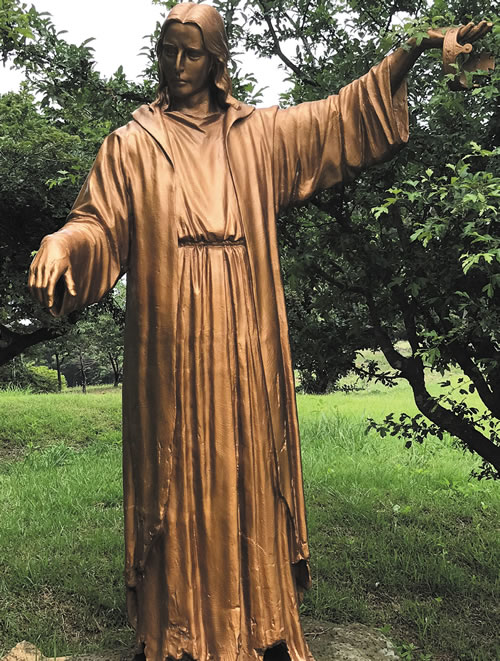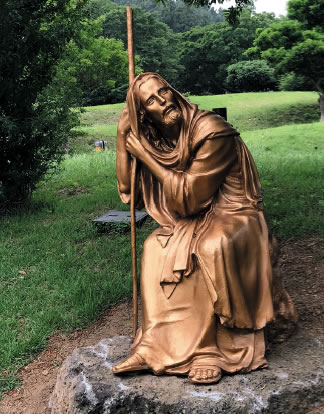
Weakness and Compassion
Strolling along the path, I turned a corner and suddenly my eye caught a statue. At first, I was unsure if the figure was male or female, human or angelic, but its pose was striking and attractive. One arm was outstretched, holding a crown. The facial expression was firm and persuasive, as if it were saying, “This crown is for you; come and get it.” This mysterious figure had indeed a beautiful and stylish appearance.

The statue is one of many that form scenes depicting the life of Jesus, which are scattered around the Hill of Grace Sanctuary in Jeju Island, Korea. The large garden, laced with paths, has become a place for pilgrims to meditate on the life and mission of Jesus.
As I drew closer to the mysterious figure, I realized that it was part of a larger scene. There was another figure, that of Jesus, who was in a seated position nearby. However, Jesus’ appearance seemed to indicate that he was ill at ease with himself. His feet were facing in one direction, his gaze in another direction, while his hands were firmly clutching his staff. It was clear from his gaze that he was curious about the beautiful and stylish figure nearby, and was enchanted by the gold crown that was being dangled before him. However, the tight grip on his staff seemed to indicate that he was tense, perhaps fearful that his hands might spontaneously reach out and grasp that crown. From his pose, it was obvious that Jesus felt himself pulled in different directions.
As I absorbed the scene, I gradually realized that it portrayed Jesus being tempted in the desert. The beautiful and stylish figure holding out the crown to him was Satan. What a contrast to the image of Satan that I had become familiar with during my childhood! A despicable creature with horns, fiery tongue, and long tail, carrying a large fork. How could anyone be tempted to follow such an ugly brute! In contrast, there was something attractive, almost captivating, about the beautiful and stylish figure before me. The gold crown, glistening in the sunlight, was also enticing. As I stood reflecting on the scene, gradually it all made sense. We are too clever to succumb to evil when its ugliness is laid bare before us. However, when it comes to us camouflaged as something good and beautiful, disguised as something attractive and enticing, we can so easily take it into our lives. Only later, when the mask falls away do we realize that we were deluded and mistaken.

As I stood gazing at the scene, it became clear that Satan had so cleverly disguised himself that there were times when even Jesus felt unsure about what was truly good. Maybe Jesus was surprised to discover that Satan could even quote Bible verses in order to lure him down the wrong track!
During times of confusion, doubt and temptation, I find consolation in knowing that Jesus also had similar experiences, that there were days and nights, not just in the desert, but also during his public ministry, when he struggled greatly to figure out the right path and follow the Father’s will. It is reassuring to realize that Jesus felt tempted like me to reach out and grasp superficial attractions, easy answers and self-centered solutions in the face of the complexity of life. The author of the letter to the Hebrews captures very succinctly this astonishing truth when he writes: “For we do not have a high priest who is unable to empathize with our weaknesses, but we have one who has been tempted in every way, just as we are – yet he did not sin.” (Hebrews 4:15)
The fact that Jesus was tempted in every way that we are tempted means that he truly was one of us, that he became fully human. Indeed, the temptations that he experienced have become a gift for us because now he can empathize with us in our weaknesses: “He is able to deal gently with those who are ignorant and are going astray, since he himself is subject to weakness.” (Hebrews 5:2) Yes, the temptations that Jesus experienced have become the well-spring of his compassion and mercy towards us.
As I reflected on this close link between weakness and compassion, between temptation and mercy in the heart of Jesus, I came to realize that my own weaknesses and temptations are invitations to become more compassionate and merciful to others. The more that I accept my own weaknesses, the more compassionate I become towards those around me who are also struggling to choose the right path. The more that I acknowledge my own difficulties in following God’s will, the more forgiving I become towards those who around me who falter in their faith.
This Lenten season as I recall that scene in the Hill of Grace Sanctuary, my prayer is that I might be given wisdom to see beyond stylish appearances in order to recognize what is truly good. I also pray for the grace to experience and recognize my own weaknesses in order to develop a merciful heart, like that of Jesus, in my relationships with others.
Columban Fr. Timothy Mulroy serves on the Society’s General Council in Hong Kong.


 The Columbans are a society of missionaries, including priests and lay people, who minister to people of various cultures as a way of witnessing to the universal love of God.
The Columbans are a society of missionaries, including priests and lay people, who minister to people of various cultures as a way of witnessing to the universal love of God.